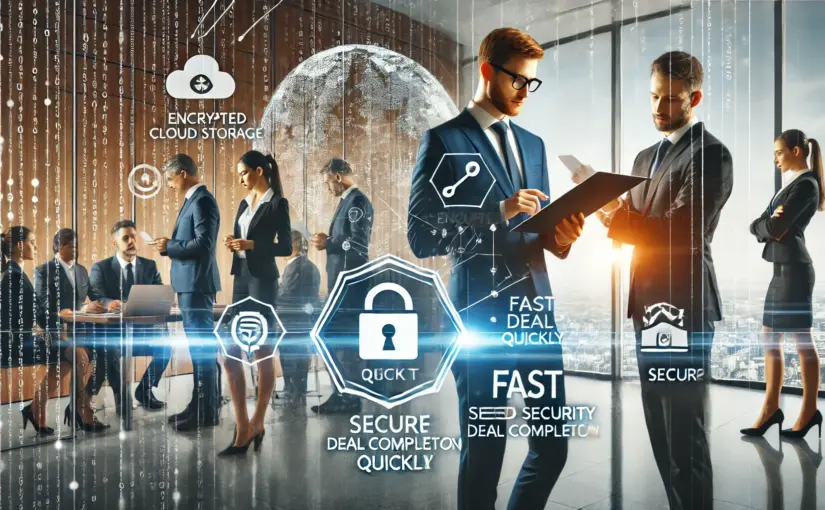
Data room security faces unprecedented challenges as we approach 2025, with Australian businesses increasingly becoming targets for sophisticated cyber threats. Nearly 60% of organizations experienced data breaches last year, costing an average of $4.35 million per incident. These alarming figures highlight why robust protection for your sensitive documents isn’t just recommended—it’s essential for survival.
As cyber attackers develop more advanced techniques, particularly AI-powered strategies, traditional security measures no longer provide adequate protection. Consequently, businesses must adapt their data room infrastructure to meet emerging threats. The stakes are especially high for Australian companies, which must navigate both global cybersecurity challenges and specific local regulations that continue to evolve.
This guide examines what you need to know about data room security in 2025, from identifying new threats to implementing cutting-edge protection strategies that keep your business both compliant and secure.
The New Threat Landscape for Data Rooms in 2025
The cybersecurity battlefield has dramatically shifted for virtual data rooms, with threat actors deploying increasingly sophisticated tools to breach sensitive information repositories. Security professionals now face two major emerging threats that demand immediate attention.
Rise of AI-driven cyberattacks
AI-powered attacks have moved from theoretical concerns to actual threats, with 87% of security professionals reporting their organization encountered an AI-driven cyber-attack in the past year. These attacks represent a fundamental shift in how adversaries operate, making previously complex and resource-intensive attacks accessible to a wider range of cybercriminals.
AI agents now autonomously scan networks for vulnerabilities, analyze defense systems, and launch precision attacks with minimal human intervention. Unlike traditional bots that follow rigid scripts, these agents can adapt their approach when encountering obstacles and avoid detection measures. Security researchers have already identified multiple AI agents actively probing systems, with confirmed instances originating from Hong Kong and Singapore.
What makes these threats particularly dangerous is their scalability. AI enables attackers to:
- Identify vulnerable targets and customize attacks based on specific data room configurations
- Generate perfectly tailored phishing messages that mimic legitimate communications
- Deploy self-learning malware that adapts to environments and evades detection systems
- Create convincing deepfakes for social engineering attacks against data room administrators
“I think ultimately we’re going to live in a world where the majority of cyberattacks are carried out by agents,” warns Mark Stockley, security expert at Malwarebytes. This prediction could materialize sooner than expected, with some experts suggesting we could face widespread agentic attacks as early as this year.
Evolution of ransomware targeting virtual data rooms
Meanwhile, ransomware attacks against data rooms have grown more targeted and sophisticated. Researchers have observed a steady increase in ransomware specifically designed to target virtualized environments, which form the backbone of many enterprise data room software solutions.
The fourth quarter of 2024 experienced the highest level of ransomware activity ever recorded, with 1,663 known victims posted on leak sites. Furthermore, 55 new ransomware groups emerged last year—a 67% increase compared to 2023. Notably, nearly one-third of security professionals (38%) believe ransomware will become an even greater threat when powered by AI.
Modern ransomware attacks on data rooms typically follow a sophisticated pattern: initial access through phishing or vulnerability exploitation, privilege escalation to obtain administrator credentials, access validation, data exfiltration, and finally, execution of encryption routines. Advanced groups like LockBit, BlackCat, and Akira have demonstrated specific capabilities for targeting virtualized data environments.
The most concerning development is the emergence of multi-stage extortion tactics. Beyond simply encrypting files, attackers now:
- Exfiltrate sensitive data before encryption
- Threaten public disclosure of confidential information
- Deploy DDoS attacks against victim networks
- Contact clients and suppliers to increase pressure
For Australian businesses storing critical data in virtual data rooms, these evolving threats demand a comprehensive security approach. The combination of AI-driven attacks and advanced ransomware targeting specifically data room environments creates unprecedented risk levels for unprepared organizations.
Essential Security Features Every Data Room Must Have
Securing your data room against sophisticated attacks demands a multi-layered approach with essential protective measures. As cyber threats grow more complex, particularly those targeting document repositories, organizations must implement comprehensive security features that safeguard sensitive information without compromising usability.
End-to-end encryption standards
End-to-end encryption serves as the cornerstone of data room security, ensuring information remains protected throughout its entire lifecycle. This technology encrypts data on the sender’s device and only decrypts it on the recipient’s device, making intercepted data completely unreadable to unauthorized parties—even the service provider itself cannot access the decrypted information.
Advanced data rooms employ multiple encryption layers:
- Data in transit encryption: Utilizing TLS/SSL protocols to secure information as it moves between users and servers
- Data at rest encryption: Protecting stored documents with strong encryption algorithms, often using unique keys for each piece of data
- End-to-end encryption: Applying zero-knowledge principles where encryption occurs at the device level before data leaves the system
Importantly, organizations that implement encryption correctly can prevent up to 71% of data breaches and avoid up to AUD 48.85 million in combined damage. This makes robust encryption not just a security measure but a critical business safeguard.
Multi-factor authentication and access controls
Multi-factor authentication (MFA) provides an essential additional security layer by requiring users to verify their identity through multiple methods. Effective MFA can stop 30-50% of attacks targeting login credentials 5, dramatically reducing unauthorized access risks.
Modern data rooms implement MFA through various combinations:
- Something you know (password/PIN)
- Something you have (mobile device/security token)
- Something you are (biometric data like fingerprints or facial recognition)
Beyond authentication, granular access controls ensure users can only access information relevant to their role. Administrators can precisely manage permissions at document, folder, and even page levels. Additionally, they can restrict actions like saving, printing, copying, and taking screenshots. Some advanced systems even offer “remote shredding” capabilities, allowing administrators to revoke access to downloaded documents when necessary.
IP-based restrictions further enhance security by limiting connections to approved network addresses—creating another defensive layer that remains effective even if authentication credentials are compromised.
Real-time activity monitoring and alerts
Comprehensive activity tracking provides visibility into every interaction within your data room, creating tamper-proof audit trails crucial for security and compliance. These systems record detailed information about who accessed documents, when they accessed them, and what actions they performed—often tracking activity down to individual page views.
Advanced monitoring features include:
- IP-address geocoding to track user locations (city, state, country)
- Document watches that send alerts when specific files are accessed
- Detailed activity reporting for both high-level overviews and granular analysis
- Automatic detection of unusual access patterns or behavior
Moreover, these monitoring capabilities enable organizations to identify suspicious activities in real-time. AI-enhanced systems can detect anomalies such as sudden spikes in download requests or access patterns that deviate from established norms. In essence, robust monitoring acts as both a deterrent and an early warning system—helping organizations respond swiftly to potential security incidents.
Implementing these three essential security features—encryption, authentication/access controls, and activity monitoring—creates a robust foundation for data room security. Accordingly, Australian businesses should evaluate potential data room providers based on their ability to deliver these critical protections in the face of increasingly sophisticated threats.
Australian Regulations You Must Comply With
Australian businesses managing sensitive information face strict regulatory obligations that extend beyond voluntary security measures. Compliance with these laws isn’t optional—it’s mandatory with significant penalties for violations. Understanding these requirements is crucial for proper data room governance.
Privacy Act 1988 and Notifiable Data Breaches Scheme
The Privacy Act 1988 serves as Australia’s primary legislation governing personal information handling across public and private sectors. This law applies to most Australian Government agencies and businesses with annual turnover exceeding AUD 4.59 million. However, certain small businesses handling health information, selling personal information, or providing services under government contracts must also comply despite their size.
At the core of this legislation are the 13 Australian Privacy Principles (APPs) that regulate how organizations collect, store, and handle personal information. APP 11 specifically requires organizations to implement “reasonable steps” to protect personal information from misuse, interference, loss, and unauthorized access.
Since February 2018, the Notifiable Data Breaches (NDB) scheme has imposed mandatory reporting requirements for eligible data breaches. Under this scheme, organizations must:
- Notify affected individuals and the Office of the Australian Information Commissioner (OAIC) when a data breach is likely to result in “serious harm”
- Complete reasonable assessment of suspected breaches within 30 days
- Include specific information in notifications about the breach nature and recommended steps for affected individuals
The definition of an “eligible data breach” encompasses unauthorized access, disclosure, or loss of personal information where serious harm to individuals is likely and remedial action hasn’t prevented this risk. Serious harm may include physical, psychological, emotional, financial, or reputational damage.
Upcoming cybersecurity reforms in 2025
The regulatory landscape continues to evolve with significant reforms coming into effect throughout 2025. The Cyber Security Legislative Package, passed in November 2024, introduces sweeping changes through three key acts:
- Cyber Security Act 2024
- Intelligence Services and Other Legislation Amendment (Cyber Security) Act 2024
- Security of Critical Infrastructure and Other Legislation Amendment (Enhanced Response and Prevention) Act 2024
Most provisions of the package commenced in December 2024, though Schedule 5 of the Enhanced Response and Prevention Act will take effect on April 4, 2025. This schedule significantly enhances telecommunications security obligations for critical infrastructure assets.
For data room operators, these reforms introduce several noteworthy changes:
- Mandatory ransomware payment reporting requirements
- Enhanced obligations for protecting business-critical data storage systems
- New provisions for post-incident reviews through the Cyber Review Board
- Stronger powers for regulators to issue formal directions addressing deficient risk management programs
Furthermore, the Privacy and Other Legislation Amendment Act 2024 implements 23 proposals from the government’s Privacy Act review. Key changes include introducing a tiered penalty regime for contraventions, a statutory tort for serious invasions of privacy, and new transparency requirements regarding automated decision-making.
For Australian businesses operating data rooms, compliance with these evolving regulations requires ongoing vigilance. Organizations should regularly review security protocols, participate in industry forums to stay informed of legislative developments, and consider implementing governance, risk and compliance (GRC) software to monitor changing requirements.
Common Data Room Security Mistakes to Avoid
Even businesses with advanced data room solutions often undermine their security through seemingly minor oversights. These vulnerabilities can lead to severe data breaches regardless of how sophisticated your underlying technology might be. Understanding common security pitfalls is the first step toward robust protection of your sensitive information.
Overlooking user permissions
Many data room security incidents stem directly from inappropriate permission settings. In fact, misconfigured access controls rank among the top vulnerabilities in virtual data rooms. When administrators grant users unnecessary access or fail to customize permissions based on specific roles, they inadvertently create security gaps that can be exploited.
The “least privilege” principle should guide all user permission decisions. Unfortunately, studies show that junior employees are sometimes accidentally granted administrator rights, potentially allowing them to access files not intended for their view and leak sensitive documents either unintentionally or maliciously.
Best practices for permission management include:
- Implementing view-only access for users who only need to review documents without downloading, editing, or printing capabilities
- Reserving full access exclusively for project managers or administrators who require complete control
- Creating custom permission groups based on predetermined job roles and responsibilities
- Utilizing the “View As” feature to verify exactly what each user can access
Regularly auditing user permissions throughout a project’s lifecycle is essential as roles and requirements often evolve over time.
Failing to update security protocols regularly
Security isn’t a one-time setup but rather an ongoing commitment. Outdated technology and protocols represent significant vulnerabilities that sophisticated attackers actively seek to exploit.
First and foremost, virtual data rooms must undergo regular security updates. Organizations that neglect this maintenance expose themselves to known vulnerabilities that have been patched in newer versions. Indeed, using outdated security protocols makes your systems substantially more vulnerable to attack.
Regular security audits play a vital role in maintaining robust protection. These assessments help identify weaknesses before they can be exploited and ensure all security measures remain effective against emerging threats.
Key maintenance activities include:
- Keeping all software components updated with the latest security patches
- Regularly reviewing and updating access control policies
- Conducting penetration testing to identify potential vulnerabilities
- Implementing and updating strong password policies
- Ensuring compliance with evolving regulatory requirements
Remember that failing to maintain current security standards not only increases breach risk but may also violate compliance obligations under Australian privacy laws and upcoming cybersecurity reforms.
Future-Proofing Your Data Room Security Strategy
Proactive strategies that evolve with emerging threats form the backbone of effective data room protection beyond 2025. While reactive measures address known vulnerabilities, forward-thinking approaches ensure your security stance remains resilient against tomorrow’s challenges.
Implementing AI-based threat detection
AI transforms data room security through advanced pattern recognition and anomaly detection capabilities. Machine learning algorithms analyze network traffic, user behavior, and system activity in real-time to identify suspicious patterns that might indicate a breach. Unlike rule-based systems, AI-powered solutions continuously learn from new data, improving their ability to detect sophisticated or previously unknown cyber threats.
Modern AI security systems provide crucial advantages through speed, accuracy, and adaptability. These systems process terabytes of security data simultaneously, monitoring activity across networks, endpoints, and cloud environments while reducing false positives by up to 30% compared to traditional methods.
Regular penetration testing and audits
Third-party security validations represent a critical component of future-proofed data room protection. Regular penetration testing identifies vulnerabilities before malicious actors can exploit them, while comprehensive audits verify compliance with evolving standards.
Key audit components should include:
- Detailed examination of encryption protocols
- Verification of access control effectiveness
- Assessment of intrusion detection systems
- Validation of disaster recovery procedures
Organizations should maintain detailed audit logs that track all user activities within the data room, creating accountability and supporting compliance efforts throughout the system lifecycle.
Training staff on evolving cyber risks
The human element remains an essential security layer regardless of technological advancement. Comprehensive cybersecurity awareness training should be provided annually to all personnel, covering authorized system use, protection of resources, and proper incident reporting protocols.
Tailored privileged user training becomes particularly important for administrators with expanded access rights. These specialized programs should address specific threats like business email compromise, showing staff how to identify warning signs such as unexpected payment requests or suspicious email addresses.
Organizations that invest in gamified learning experiences typically see higher engagement and knowledge retention. Simulation exercises like phishing awareness training prepare employees for real-world scenarios while measuring improvement over time.
Conclusion
Data room security presents significant challenges for Australian businesses as 2025 approaches. Cyber threats have evolved dramatically, with AI-powered attacks and sophisticated ransomware specifically targeting virtual data rooms. Consequently, organizations must implement robust security measures that include end-to-end encryption, multi-factor authentication, and comprehensive activity monitoring systems.
Australian businesses face additional pressure from stringent regulatory requirements. The Privacy Act 1988, Notifiable Data Breaches Scheme, and upcoming cybersecurity reforms demand strict compliance with increasingly complex standards. Failure to meet these obligations potentially results in severe penalties and reputational damage that many organizations cannot afford.
Common security mistakes continue to undermine even sophisticated systems. Overlooking proper user permissions and failing to update security protocols regularly create vulnerabilities that attackers eagerly exploit. Therefore, regular security audits and permission reviews should become standard practice for all data room administrators.
Future-proofing your data room security strategy requires a multi-faceted approach. AI-based threat detection provides early warning of potential breaches, while regular penetration testing identifies vulnerabilities before malicious actors can exploit them. Additionally, comprehensive staff training addresses the human element that remains critical regardless of technological advancement.
Ultimately, data room security demands constant vigilance and adaptation. Threats will continue to evolve, regulatory requirements will shift, and security best practices will advance. Organizations that commit to comprehensive protection strategies now will stand better prepared for whatever challenges emerge next. Though implementing robust security measures requires significant investment, the alternative—data breaches costing millions and potentially devastating your business—makes this investment essential rather than optional.







